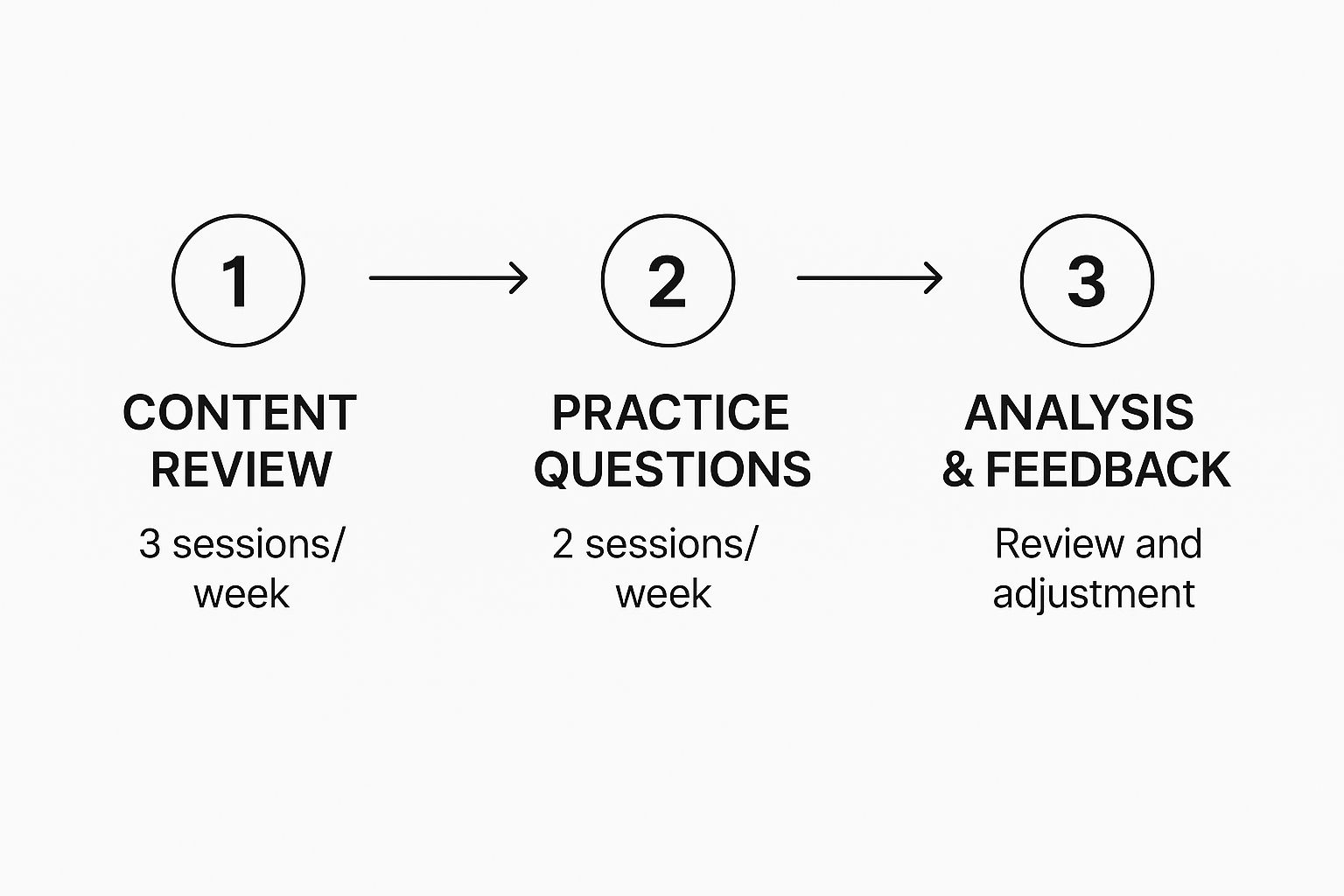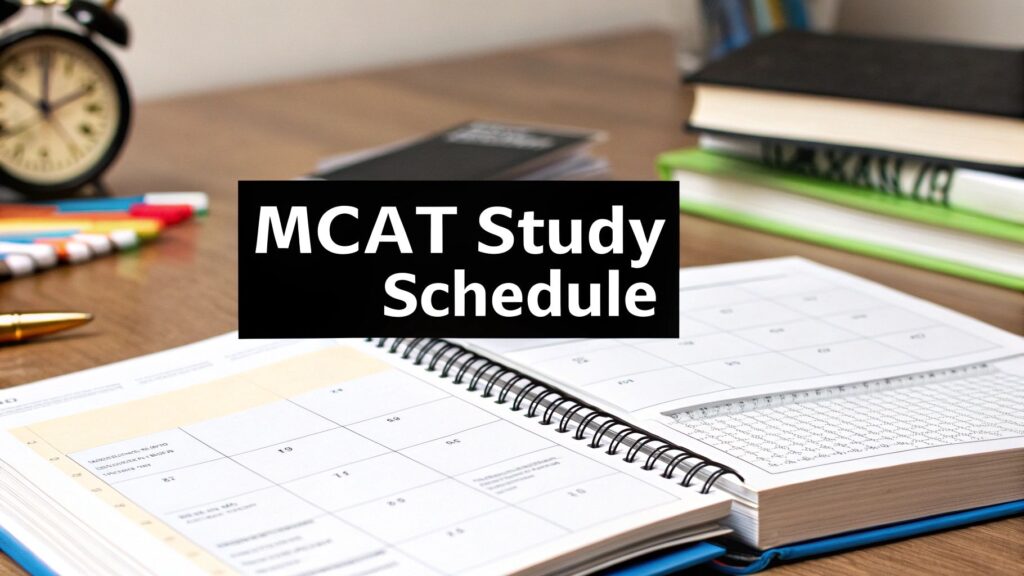An effective MCAT study schedule isn't just a calendar—it's your strategic roadmap to a top score. Most successful students put in 300-500 total hours of dedicated prep. That might look like three solid hours a day for three months, or more spaced-out sessions over a longer period. It's a serious commitment that has to cover content review, tons of practice questions, and full-length exams.
Laying the Foundation for Your MCAT Prep
Before you dive into a weekly schedule, you need to set the groundwork. Think of it as gathering your tools before you start building a house. A strong foundation keeps your study plan from falling apart when the pressure mounts.
This means getting real with yourself, picking the right resources, and planning for the long haul. These first steps are about creating a system that actually works with your life, not against it.
Figure Out Your Starting Point and Your Goal Score
Your journey starts with two numbers: your baseline score and your target score.
First things first, take a full-length diagnostic practice exam. Do it under real, timed conditions. The goal here isn't to get a fantastic score—it's to get an honest one. This diagnostic is your "You Are Here" marker. It will mercilessly expose your content gaps and timing issues, which is exactly what you need.
Next, decide on your destination: your target MCAT score. Look up the average scores for the medical schools on your list. Be ambitious, but keep it realistic. The gap between your diagnostic and target scores defines the challenge. A 15-point jump demands a totally different level of commitment than a 5-point bump.
Key Takeaway: Your diagnostic test and target score are the two pillars of your entire MCAT study plan. Without them, you’re just studying blind, with no real way to track progress or know when you’ve hit your goal.
Lock In Your Test Date and Timeline
With your start and end points defined, it’s time to connect the dots. Picking your MCAT test date is the most critical decision you'll make at this stage, because everything else in your schedule works backward from that deadline.
Be brutally honest about your other commitments. Classes, a job, volunteering, and—yes—time for rest are all part of the equation.
As we mentioned, a good MCAT study plan usually falls between 300 to 500 hours. If you're aiming for a three-month plan (~90 days), you’ll need to study over three hours every single day to hit that 300-hour minimum. For many, a four-to-five-month timeline feels much more manageable, letting you cover the material thoroughly without completely burning out.
Once you know how many hours you can realistically commit each week, you can pick a test date that makes your total-hour goal achievable. For more on this, check out these expert takes on MCAT study hour breakdowns.
To help you visualize this, here’s a look at how those hours might break down across different timelines.
Sample MCAT Study Timelines
This table illustrates how total study hours break down into daily commitments across different preparation timelines, helping you choose the right path.
| Total Timeline | Total Study Hours | Average Daily Study Time (approx.) | Best For |
|---|---|---|---|
| 3 Months | 300 – 350 | 3.5 – 4 hours/day | Students with minimal other commitments (e.g., studying over a summer break) who can handle an intense pace. |
| 4 Months | 350 – 400 | 3 – 3.5 hours/day | Students balancing a part-time job or a lighter course load. Offers a good mix of intensity and flexibility. |
| 5 Months | 400 – 450 | 2.5 – 3 hours/day | Students with significant work or school commitments. Allows for a slower, more methodical pace with buffer days. |
| 6 Months | 450 – 500 | 2.5 hours/day | Students working full-time or taking a heavy course load. Requires strong long-term discipline. |
This table gives you a clear picture of the daily grind required for each timeline. Choose the one that aligns with your life, not the one you think you should be doing.
Choose Your Study Materials
The final foundational step is to assemble your arsenal of resources. The materials you pick will be your daily companions, so choose wisely. The best approach is a combination of solid content review books and a top-tier question bank.
Here’s what you absolutely need:
AAMC Official Materials: These are non-negotiable. The AAMC (Association of American Medical Colleges) creates the MCAT, so their practice exams, question packs, and section bank are the gold standard. Seriously, nothing else comes close to mimicking the real test. Save these precious resources for the final phase of your prep.
Third-Party Content Review Books: Companies like Kaplan, The Princeton Review, or Blueprint Prep offer great book sets that cover all the science you need to know. My advice? Pick one company's set and stick with it. Mixing and matching can get confusing when different books explain the same concept in slightly different ways.
Third-Party Question Banks: A high-quality QBank is your best friend for daily practice. A platform like UWorld offers thousands of questions with fantastic, detailed explanations. This is where you’ll grind out problems to make sure the content you’re reviewing actually sticks.
Building Your Personalized MCAT Study Framework

Let's get one thing straight: a generic, one-size-fits-all MCAT study schedule is a recipe for frustration and burnout. Your life, your learning style, and your academic background are completely unique. So, your study plan has to be, too. The real goal is to build a framework that gives you enough structure to make real progress but is flexible enough to handle, well, life.
Think of yourself as the architect of your own success. You wouldn't use the same blueprint for a tiny house and a skyscraper, right? In the same way, your schedule needs to be custom-built around your world, whether you're a full-time student, juggling a job, or have other major commitments pulling at your time.
Find Your Weekly Rhythm
First things first, you need a scheduling model that actually fits your life and personality. One of the most effective methods I've seen students use is block scheduling. Instead of vaguely planning to "study" for a few hours, you dedicate specific "blocks" of time to particular subjects or tasks. It completely removes the guesswork.
For example, a full-time student might block out Monday, Wednesday, and Friday mornings for heavy content review. Someone working a 9-to-5 might dedicate a couple of weeknights and a larger, more focused block on Saturday to their prep.
Here’s a glimpse of what a single day's block schedule could look like:
- 9:00 AM – 11:00 AM: Biology Content Review (e.g., Cellular Respiration)
- 11:00 AM – 12:00 PM: Biology Practice Questions (30 questions on Cellular Respiration)
- 12:00 PM – 1:00 PM: Lunch & Mental Reset
- 1:00 PM – 2:30 PM: CARS Practice (3 Passages with detailed review)
This approach gives every day a clear, actionable mission, which cuts down on decision fatigue and keeps you locked in. Consistency is everything here. And to get the most out of every minute, think about using some digital tools. A quick search for the top Chrome extensions for productivity) can uncover some game-changers for your workflow.
The Content vs. Practice Balancing Act
One of the most common mistakes I see is students getting stuck in passive content review—just reading chapter after chapter—and neglecting active practice. A winning MCAT schedule integrates both from day one. A solid rule of thumb is to start with a 70% content/30% practice split in your early prep phase, then gradually flip it to 30% content/70% practice as you get closer to test day.
How do you do this? Simple. Immediately after a content review session, dive into practice questions on that exact topic. Just finished a chapter on thermodynamics? Go straight to a block of physics questions covering that material. This immediate application is what makes the information stick and instantly exposes what you don't really know.
Expert Insight: Don't wait until you feel like you've "mastered" a subject to start doing practice questions. The questions themselves are one of the most powerful learning tools you have. They teach you how the AAMC tests concepts and show you where your real weaknesses are hiding.
This constant dance between learning and applying is what forges durable knowledge. If you want to see how this plays out over several months, you can check out our comprehensive MCAT study plan for a detailed timeline.
https://acemedboards.com/mcat-study-plan/
Weaving in All Four MCAT Sections
It's absolutely critical to give every one of the four MCAT sections some love each week. If you neglect a subject, even one you feel good about, you risk watching your score drop. Your schedule should be designed to rotate through all subjects systematically.
Here's one way to structure it:
- Monday & Thursday: Focus on Chem/Phys and Psych/Soc.
- Tuesday & Friday: Focus on Bio/Biochem and CARS.
- Wednesday: A lighter day for reviewing missed questions and hitting flashcards.
- Saturday: Full-Length Practice Exam day.
- Sunday: Rest, recharge, and maybe a light review of your full-length.
This kind of structure ensures no topic gets left in the dust for too long. You also have to respect the beast that is the MCAT. It has four sections, each with 53 to 59 questions and unforgiving time limits of 90 to 95 minutes. Building mental endurance is just as important as knowing the content. Medical schools want to see a balanced performance, making a well-rounded study approach non-negotiable for a competitive score.
And please, always schedule rest. Burnout is the number one enemy of any long-term study plan. Intentionally schedule at least one full day off every single week. This isn't being lazy; it's a strategic move to protect your mental health and make sure you can perform at a high level for the entire marathon, not just the first sprint.
Integrating Active Learning with Content Review

Here's one of the biggest mistakes you can make in your MCAT prep: simply reading and highlighting your way through a mountain of books. It feels productive, but it’s a trap. The MCAT doesn’t just test what you know; it tests how you apply what you know.
To succeed, you have to move beyond passive review and embrace active learning. This is where you build durable, test-ready knowledge with every study hour. Passive learning is easy and comfortable, like re-watching a video. Active learning is harder work, but it’s what forces your brain to retrieve and use information, forging much stronger neural connections. The goal is to make this shift a core part of your mcat study schedule from day one.
Move From Reading to Explaining
One of the most powerful active learning strategies is the Feynman Technique. The concept is simple. Instead of just reading about glycolysis, try to explain the entire pathway out loud to an imaginary student who knows nothing about it. Grab a whiteboard or a blank piece of paper and talk it through.
You'll quickly—and sometimes painfully—find the exact spots where your understanding crumbles. These are your true knowledge gaps. This method is brutally honest and far more effective than just rereading a chapter until it feels "familiar." You aren't just learning a concept; you are forced to truly internalize it.
Key Insight: If you can't explain a concept in simple terms, you haven't truly learned it yet. The struggle to explain is where the real learning happens, turning shaky knowledge into solid understanding.
This simple act of teaching transforms you from a passive recipient of information into an active participant in your own education.
Connect Chapters Directly to Questions
The best way to make a concept stick is to apply it immediately. A winning MCAT study schedule doesn’t create a hard separation between "content days" and "practice days." Instead, it weaves them together into a seamless workflow.
Here’s what this looks like in practice:
- First, you complete your content review for a specific topic, like acids and bases in general chemistry.
- Next, you immediately open your QBank (like UWorld) and do a block of 15-20 practice questions filtered for that exact topic.
- Then, you thoroughly review every single question—the ones you got right and the ones you got wrong.
This immediate feedback loop is critical. It shows you precisely how the MCAT will test the information you just learned, highlighting high-yield details and common traps. If you wait days or weeks to do practice questions, you’ll forget the nuances, making the entire exercise far less effective.
Leverage Spaced Repetition for Long-Term Memory
Your brain is literally wired to forget information over time. It's a feature, not a bug. Spaced repetition is the scientifically-backed method for fighting this natural "forgetting curve." Instead of cramming a topic once and hoping it sticks, you review it at increasing intervals, reinforcing your memory each time.
Digital flashcard tools like Anki are perfect for this. When you learn a new concept, you create a flashcard. The software's algorithm then shows you that card right before you’re about to forget it.
- Day 1: You learn the amino acids.
- Day 2: Anki shows you the cards again.
- Day 4: You see them again.
- Day 10: And so on. The interval grows as your recall strengthens.
This method of active recall is incredibly efficient. It ensures that the foundational knowledge you learn in month one is still fresh and accessible in your mind in month four. For a deeper look, plenty of resources explain the benefits of active recall for medical students, showing how this technique builds a robust knowledge base for demanding exams. This isn't just about memorizing isolated facts; it's about building an interconnected web of knowledge that you can access under pressure.
How to Master Practice Exams and Analyze Performance
Full-length practice exams are the closest you'll get to the real MCAT before test day. Think of them as more than just a score report; they are the single most powerful diagnostic tool in your MCAT study schedule. To really squeeze every bit of value out of them, you have to treat them with the seriousness of the real thing and then dissect the results like a scientist.
This means simulating test-day conditions perfectly. Don’t do this in bed with music on. Find a quiet spot, like a library study room, where you won't be disturbed. You need to time every section, right down to the breaks. This is how you build the mental stamina for the grueling 7.5-hour marathon that is the actual MCAT.
The Art of Detailed Exam Review
A score is just a number. The real learning happens in the hours you spend breaking down the exam afterward. Your goal isn't just to see what you got wrong, but to understand why you got it wrong. Every incorrect answer is a breadcrumb trail leading you straight to a weakness you can fix.
After each full-length exam, block out at least four to six hours for a deep-dive review. I highly recommend creating a simple log or spreadsheet to track every single error. This isn't about shaming yourself; it’s about finding patterns.
Key Insight: Don't just review your wrong answers. You absolutely must review any question you guessed on, even if you got it right. Luck isn't a strategy you can count on, and figuring out the logic behind a correct guess is just as valuable as analyzing a mistake.
Once you start cataloging your mistakes, trends will emerge. Maybe you're consistently missing questions on a specific biochemistry pathway. Or perhaps you keep running out of steam on the Chem/Phys section. This data-driven approach turns a frustrating score into a concrete, actionable plan.
From Analysis to Actionable Steps
Pinpointing why you made a mistake is step one. The second, and more critical, step is creating a plan to fix it. This is where your error log becomes your most valuable asset.
To make this process systematic, I suggest using a simple framework. It helps you move from just identifying an error to creating a tangible task that will prevent it from happening again.
Practice Exam Review Framework
A systematic approach to analyzing incorrect answers on your practice exams to identify patterns and guide future studying.
| Question | Your Answer | Correct Answer | Reason for Error (e.g., Content Gap, Misread, Calculation Error, Guessed) | Actionable Step |
|---|---|---|---|---|
| B/B #24 | C | A | Content Gap | Review the Krebs cycle chapter; create new flashcards for key enzymes. |
| C/P #41 | B | D | Misread Question | Slow down on questions with "NOT" or "EXCEPT." Highlight keywords. |
| P/S #12 | A | A | Guessed Correctly | Review Erikson's stages of development; I was not confident in my reasoning. |
| CARS #18 | D | B | Timing Error | Practice three timed CARS passages daily to improve pacing. |
This kind of detailed log transforms your mistakes into a personalized study guide, making sure your future efforts are laser-focused and efficient.
Many students find this structured rhythm is what finally makes things click. For instance, a six-month study plan might dedicate Sundays to these intense 7-hour practice tests. Then, the rest of the week is spent on targeted content review based directly on those results. This methodical routine builds stamina and provides a clear way to see your progress. If you're curious about what a longer timeline looks like, you can explore Magoosh's 6-month MCAT plan to see this structure in action.
This weekly cycle of review, practice, and analysis is what drives improvement, as shown in the visual below.

This feedback loop is the engine of your prep. A full-length exam isn't the end of a study week; it's the beginning of the next one. It hands you a clear roadmap of exactly what to work on. Mastering this cycle is how you steadily climb toward your goal score.
Adjusting Your Plan and Avoiding Burnout

Let's be real: no matter how perfectly you map out your MCAT study schedule, life is going to get in the way. It always does. You might hit an unexpectedly brutal exam week, a single topic could take twice as long as you planned, or you might just feel completely wiped out.
The real skill isn't in creating a rigid, unbreakable plan. It's in building a resilient one that can bend when it needs to. A perfect schedule on paper is worthless if it drives you straight into the ground. The MCAT is a marathon, and burnout is the silent killer of great scores.
Recognizing The Signs And Staying Fresh
Burnout is a gradual creep. It doesn’t happen overnight. It sneaks up on you when you're not paying attention, slowly chipping away at your focus and motivation. Learning to spot the early symptoms is your first line of defense.
Keep an eye out for these warning signs:
- A bone-deep exhaustion that sleep just can't seem to touch.
- Losing all interest in subjects you used to find at least a little engaging.
- Watching your practice question accuracy or full-length scores take a nosedive.
- Feeling constantly irritable, anxious, or just plain overwhelmed by it all.
If any of that sounds familiar, it's time to hit the brakes. The answer isn't to push harder; it's to recover smarter. The pressure is immense, and understanding how to manage it is a skill in itself. The principles for avoiding burnout are universal for high-stakes medical exams, and you can learn more by reading about how to tackle USMLE exam burnout.
How To Adapt Your Schedule On The Fly
Flexibility is your single greatest asset. When life throws a wrench in your plans, your schedule needs to absorb the hit. The trick is to make deliberate, strategic adjustments instead of just letting the whole thing crumble.
Imagine you budgeted three days for a tough organic chemistry chapter, but it ends up taking you a full week. Don't panic. Instead of desperately trying to cram the next topic, look at your schedule and make a smart trade-off. Can you combine two lighter review sessions later in the month? Or maybe shave a little time from a subject where you feel more confident?
Key Takeaway: Making an adjustment isn't a failure; it's a necessary course correction. A good MCAT study schedule has buffer days built in for exactly this reason. Use them to catch up, drill difficult concepts, or just take a much-needed day off.
This proactive approach keeps you in the driver's seat and stops one bad week from derailing your entire timeline. Your plan is there to serve you, not the other way around.
Protecting Your Mental and Physical Well-Being
Your brain is your most important tool for the MCAT, and it needs maintenance. This goes way beyond just memorizing pathways and formulas. It’s about actively managing your energy so you can show up on test day feeling strong, not fried.
One of the best things you can do is schedule mandatory rest days. And I mean truly mandatory—zero-studying-allowed days. Go for a hike, see your friends, binge a show. This isn't "lost" study time. It's a critical investment in your long-term performance.
And please, don't neglect the basics. Sleep, exercise, and decent food aren't luxuries during MCAT prep; they're non-negotiable parts of your plan. Optimizing your physical health is just as important as the content itself. You can even explore how specific nutrition for brain health to enhance memory and focus can give you an edge. Building this resilience ensures you're not just ready with the knowledge, but also with the mental fortitude to win.
Of course. Here is the rewritten section, formatted to sound like it was written by an experienced human expert and matching the provided style examples.
Answering Your Top MCAT Schedule Questions
Even with the perfect study plan on paper, the reality of MCAT prep brings up a ton of questions. Let's tackle some of the most common ones I hear from students who are deep in the trenches.
How Long Should I Really Study For The MCAT?
The honest answer? It depends. Most students find themselves in the 300 to 500-hour range. If you can treat studying like a full-time job, that often translates to an intense three months. If you're juggling classes, work, or other commitments, a four to six-month timeline is much more realistic and sustainable.
Your best bet is to take a diagnostic test right away. This gives you a brutally honest starting point. Once you know where you stand, you can set a target score. From there, you can work backward, figuring out how many hours you can realistically dedicate each week without completely burning out. A longer, less frantic schedule almost always leads to better retention of the material.
Should I Focus On My Weakest Subjects First?
This is a classic MCAT prep dilemma. While it’s tempting to hammer away at your weakest areas from day one, it's a delicate balancing act. You should absolutely give those weaker subjects extra love early on, but not at the expense of everything else.
A smarter approach involves a consistent, spaced review of all topics. This keeps your stronger subjects from getting rusty while you shore up your weaknesses.
As you start taking practice tests, let the data guide you. Your score reports will pinpoint specific concepts that need more work. But don't make the mistake of completely ignoring your strengths—you still need to maintain that knowledge. The goal is to avoid developing new weak spots while you're busy fixing the old ones.
How Many Practice Tests Should I Take?
Here's a mantra to live by: quality over quantity. Aiming for 8 to 12 full-length exams is a solid target for most students. The non-negotiable part of this is prioritizing the official AAMC practice tests. They are, without a doubt, the most accurate preview of what you'll face on test day.
Ultimately, the number of tests you take is far less important than how you review them. One exam that you've analyzed inside and out—where you understand the logic behind every single mistake—is infinitely more valuable than three tests where you just glanced at the score and moved on.
What Should My Final Week Of Studying Look Like?
Your final week is about tapering, not cramming. The heavy lifting should be done. This is the time for light review and serious rest.
Focus your energy on flipping through your notes, high-yield concept sheets, and maybe some quick flashcard drills. The goal is just to keep the information active in your mind, not to learn anything new.
Take your last full-length exam about a week before your test date. This gives you time to review it without adding any last-minute stress. The day before the MCAT should be 100% study-free. Seriously. Relax, eat a good meal, get a full night's sleep, and walk into that test center feeling confident and rested, not frazzled and exhausted.
Feeling overwhelmed by the MCAT? A personalized approach can make all the difference. The expert tutors at Ace Med Boards can help you build a custom study schedule and master the content you need for a top score. Book a free consultation today to start your journey.

